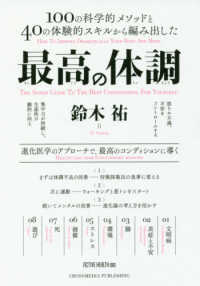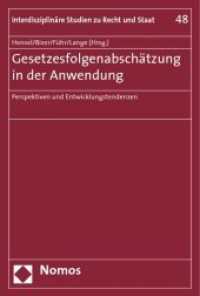- ホーム
- > 洋書
- > 英文書
- > Science / Mathematics
Full Description
This book describes the fundamentals of particle detectors as well as their applications.
Detector development is an important part of nuclear, particle and astroparticle physics, and through its applications in radiation imaging, it paves the way for advancements in the biomedical and materials sciences. Knowledge in detector physics is one of the required skills of an experimental physicist in these fields. The breadth of knowledge required for detector development comprises many areas of physics and technology, starting from interactions of particles with matter, gas- and solid-state physics, over charge transport and signal development, to elements of microelectronics.
The book's aim is to describe the fundamentals of detectors and their different variants and implementations as clearly as possible and as deeply as needed for a thorough understanding. While this comprehensive opus contains all the materials taught in experimental particle physics lectures or modules addressing detector physics at the Master's level, it also goes well beyond these basic requirements.
This is an essential text for students who want to deepen their knowledge in this field. It is also a highly useful guide for lecturers and scientists looking for a starting point for detector development work.
Contents
1: Introduction
2: Overview, history and concepts
3: Interactions of particles and matter
4: Movement of charge carriers in electric and magnetic fields
5: Signal formation by moving charges
6: Non-electronic detectors
7: Gas-filled detectors
8: Semiconductor detectors
9: Track reconstruction and momentum measurement
10: Photodetectors
11: Cherenkov detectors
12: Transition radiation detectors
13: Scintillation detectors
14: Particle identification
15: Calorimeters
16: Detectors for cosmic particles, neutrinos and exotic matter
17: Signal procesisng, readout and noise
18: Trigger and data acquisition systems








